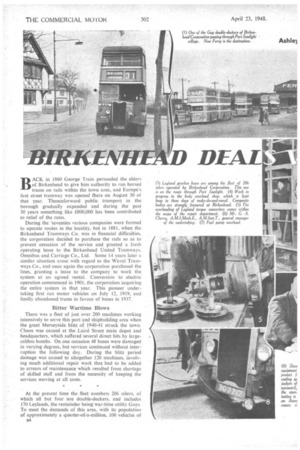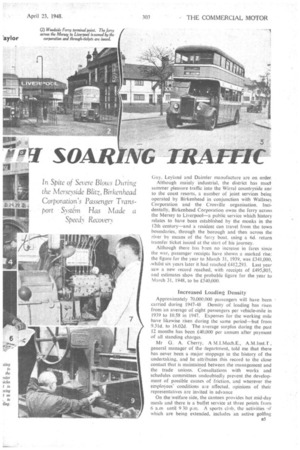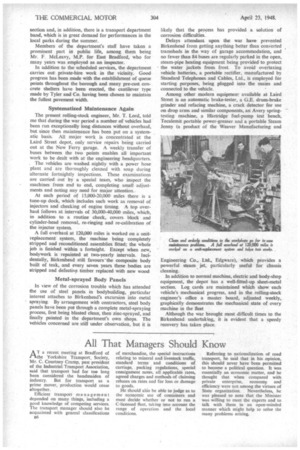LBIRKENH D DEAL
Page 38

Page 39

Page 40

If you've noticed an error in this article please click here to report it so we can fix it.
a:14 SOAR
NC TRAFFIC
BACK in 1860 George Train persuaded the elders of Birkenhead to give him authority to run horsed trams on rails within the town area, and Europe's first street tramway was opened there on August 30 of that year. Thenceforward public transport in the borough gradually expanded and during the past 30 years something like £800,000 has been contributed to relief of the rates.
During the 'seventies various companies were formed to operate routes in the locality, but in 1881, when the Birkenhead Tramways Co. was in financial difficulties. the corporation decided to purchase the rails so as to prevent cessation of the service and granted a fresh operating lease to the Birkenhead United Tramways, Omnibus and Carriage Co., Ltd. Some 14 years later a similar situation arose with regard to the Wirral Tramways Co., and once again the corporation purchased the lines, granting a lease . to the company to• work the system. at an agreed rental. Conversion to electric operation commenced in 1901, the corporation acquiring the entire system in that year. This pioneer undertaking first ran motor vehicles on July 12, 1919, and finally abandoned trams in favour of buses in 1937.
Bitter Wartime Blows There was a fleet of just over 200 machines working intensively to serve this port and shipbuilding area when the great Merseyside blitz of 1940-41 struck the town. Chaos wws caused at the Laird Street main depot and headquarters, which suffered several direct hits by largecalibre bombs. On one occasion 48 buses were damaged in varying degrees, but services continued without interruption the following day. During the blitz period damage was caused to altogether 120 machines, involving much additional repair work that had to be added to arrears of maintenance which resulted from shortage of skilled staff and from the necessity of keeping the services moving at all costs.
At the present time the fleet numbers 206 oilers, of which all but four ,are double-deckers, and includes 170 Leylands, the remainder being war-time utility Guys To meet the demands of this area, with its population of approximately a quarter-of-a-million, 100 vehicles of
B4 Guy. Leyland and Daimler manufacture are on order. Although mainly industrial, the district has mud
summer pleasure traffic into the Wirral countryside an to the coast resorts, a number of joint services bein operated by Birkenhead in conjunction with Wallasey Corporation and the Crosville organisation. Incidentally, Birkenhead Corporation owns the ferry across the Mersey to Liverpool—a public service which history relates to have been established by the monks in the 12th century—and a resident can travel from the town boundaries, through the borough and then across the river by means of the ferry boat. using a 6d. return transfer ticket issued at the start of his journey.
Although there has hen no increase in fares since the war, passenger receipts have shown a marked rise: the figure for the year to March 31, 1939, was £341,000. whilst six years later it had reached £412,291 Last year saw a new record reached, with receipts of £495,805, and estimates show the probable figure for the year to March 31, 1948, to be £540,000.
increased Loading Density Approximately 70,000,000 passengers will have been carried during 1947-48 Density of loading has risen from an average of eight passengers per vehicle-mile in 1939 to 10.58 in 1947. Expenses for the working mile have likewise risen during the same period—but from 9.31d. to 16.02d. The average surplus during the.past 12 months has been £40,000 per annum after payment of all standing charges.
Mr G. A. Cherry, A M.I.Mech.E., A.M.Inst.T , general manager of the department, told me that there has never been a major stoppage in the history of the undertaking, and he attributes this record to the close contact that is maintained between, the management and the trade unions. Consultations with works and schedules committees undoubtedly prevent the development of possible causes of friction, and wherever the employees' conditions al-e affected, opinions of their representatives are invited in advance On the welfare side, the canteen provides hot mid-day meals and there is a buffet service at three points from 6 a.m until 9 30 p.m. A sports club, the activities ,)f which are being extended, includes an active golfing
section and, in addition, there is a transport department band, which is in great demand for performances in the local parks during the summer.
Members of the department's staff have taken a prominent part in public life, among them being Mr. F McLeavy, M.P. for East Bradford, who for many years was employed as an inspector.
In addition to the scheduled services, the department carries out private-hire work in the vicinity. Good progress has been made with the establishment of queue points throughout the borough and many pre-cast concrete shelters have been erected, the cantilever type made by Tyler and Co. having been chosen to maintain the fullest pavement width.
Systematized Maintenance Again
The present rolling-stock engineer, Mr. T. Lord, told me that during the war period a number of vehicles had been run exceptionally long distances without overhaul, but since then maintenance has been put on a systematic basis. All major work is concentrated at the Laird Street depot, only service repairs being carried out at the New Ferry garage. A weekly transfer of buses between the two points enables all important work to be dealt with at the engineering headquarters. . The vehicles are washed nightly with a power hose plant and are thoroughly cleaned with soap during alternate fortnightly inspections. These examinations are carried out by a special team, who inspect the machines from end to end, completing small adjustments and noting any need for major attention..
At each period of 15,000-20,000 miles there is a tune-up dock, which includes such work as removal of injectors and checking of engine timing. A top overhaul follows at intervals of 30,000-40,000 miles, which, in addition to a routine check, covers block and cylinder-head removal, re-ringing and re-calibration of the injector system.
A full overhaul at 120,000 miles is worked on a unitreplacement system, the machine being completely stripped and reconditioned assemblies fitted; the whole job is finished within a fortnight. Except when new, bodywork is repainted at two-yearly intervals. Incidentally, Birkenhead still favours the composite body built of teak, and every seven years these bodies are stripped and defective timber replaced with new wood
Metal-sprayed Body Panels
In view of the corrosion trouble which has attended the use of steel panels in bodybuilding, particular interest attaches to Birkenhead's excursion into metal spraying. By arrangement with contractors, steel body panels have been put through a complete metal-spraying process, first being blasted clean, then zinc-sprayed, and finally painted in the department's own shops. The vehicles concerned are still under observation, but it is
likely that the process has provided a solution of corrosion difficulties.
Delays attendant upon the war have prevented Birkenhead from getting anything better than converted tramsheds in the way of garage accommodation, and no fewer than 84 buses are regularly parked in the open, steam-pipe heating equipment being provided to protect the water jackets from frost. To avoid overtaxing vehicle batteries, a portable rectifier, manufactured by Standard Telephones and Cables, Ltd., is employed for starting purposes, being plugged into the mains and connected to the vehicle.
Among other modern equipmeir available at Laird Street is an automatic brake-tester, a G.E. drum-brake grinder and refacing machine, a crack detector for use on drop arms and similar components, an Avery springtesting machine, a Hartridge fuel-pump test bench, Tecakmit portable power-greaser and a portable Steam Jenny (a product of the Weaver Manufacturing and
Engineering Co., Ltd., Edgware), which provides a powerful steam jet, particularly useful for chassis cleaning.
In addition to normal machine, electric and body-shop equipment, the depot has a well-fitted-up sheet-metal section. Log cards are maintained which show each vehicle's mechanical progress, and in the rolling-stock engineer's office a master board, adjusted weekly, graphically demonstrates the mechanical state of every machine in the fleet
Although the war brought most difficult times to the Birkenhead undertaking, it is evident that a speedy recovery has taken place.












































































